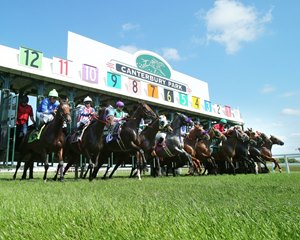Canterbury Launches Prepaid Trainer Incentive Program


Seeking to rebound from a 2023 season with diminished field size and handle, Canterbury Park announced Feb. 14 a prepaid starter incentive program to entice trainers to race at the Shakopee, Minn., track during its 54-day meet over the summer.
Incentive amounts for designated horses are determined by the location from which the trainer ships to Canterbury. Open-bred horses arriving from the furthest points of origin would be eligible for $1,500, Minnesota-breds for $750. For each start made, 25% of the incentive is earned, and up to 100% is earned for the fourth start. According to Canterbury, the incentives for a trainer can be worth as much as $37,500.
If a designated horse starts fewer than four times, the unearned portion of the prepaid incentive must be repaid to the track.
The funds would be paid upon arrival at Canterbury to approved trainers who have submitted a list of horses intended to start in Thoroughbred races during the meet May 18-Sept. 28.
The incentives differ from past ones offered by the Canterbury track, which were owner-based and incentivized running horses early in the season. While those incentives came from the purse account, the new incentive program is funded by the track, officials said. The owner-based program is no longer in place.
"Owner/trainer relationships are unique, but I feel like owners don't always tell the trainers where to go," racing operations manager Amber Carlisle said. "So if we can convince the trainers to come here, the owners will follow suit."
According to the incentive rules, trainers can submit a designated horse list with up to 20 open-bred horses and 10 Minnesota-breds that are 3 years old or older. 2-year-olds are not eligible.
Canterbury's stall allocation committee will review the list and authorize a prepaid incentive amount per trainer. That amount will be paid to the trainer when the designated horses are on the grounds, with that deadline being June 1.
Canterbury officials worked with the Minnesota Horsemen's Benevolent and Protective Association to finalize details of the incentive plan. That organization asked how a claim of a horse might affect a trainer's prepaid incentive.
"So we do have a caveat in the case that horses are claimed or injured or put on the vet's list or removed from the owner's care," Carlisle said. "We are giving trainers the ability to substitute horses."
Following the announcement, some owners on social media questioned the direction of funds toward trainers rather than owners.
"I can fully understand that as an owner myself," said Justin Revak, president of the Minnesota HBPA and head of a seven-horse stable that competes as Rocket Wrench Racing. "The first time they brought this to my attention that it would be potentially paid to the trainers, I thought the same thing. You know, I'm the one who pays the shipping fee. I'm the one who really decides where my horses are gonna go.
"But, I think it's all about keeping an open mind. ... I think if we bring more horses to Canterbury, and we can fill more races and have bigger fields, it's a win, no matter if you're an owner or a trainer."
Revak and Carlisle acknowledged the need for Canterbury to be creative to bolster its horse population. The expiration of a 10-year purse enhancement and marketing agreement between the track and the Shakopee Mdewakanton Sioux Community forced a reduction in purses last year.
Revak noted that the track has a card club that generates purse revenue, but the Minnesota track does not have full casino gambling or sports wagering.
A release from Canterbury said the trainer incentive application is to be submitted with stall applications. More information is available online.
